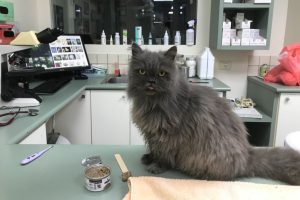Cats can exhibit some odd behaviors after being neutered, leaving pet owners wondering what’s going on with their beloved feline friends. If your cat is acting crazy post-surgery, you’re not alone. Understanding why this behavior is happening can help put your mind at ease and provide the best care for your furry companion.
After being neutered, cats may display erratic behavior due to a variety of factors. Whether it’s the anesthesia wearing off, hormonal changes, or simply the stress of the procedure, there are several reasons why your cat may be acting out. Below is a detailed outline to help you understand why your cat is behaving strangely post-neutering and how to best support them through this time.
Anesthesia Recovery
After being neutered, your furry friend might seem a bit off-kilter. This could be due to the anesthesia wearing off. Just like humans, cats can experience some side effects from anesthesia, such as disorientation or lethargy. Your cat may also act strangely because they are trying to recover from the stress of the surgery itself.
During the recovery process, it’s essential to give your cat some time and space to rest and recuperate. Make sure they have a comfortable quiet area to relax in, away from any other pets or children. Providing plenty of fresh water and some soft food can also help them feel more comfortable as they recover.
If your cat is acting crazy after being neutered, try to be patient and understanding. It’s a natural response to the anesthesia, and they should start to return to normal behavior in a few days. However, if you notice any severe or prolonged changes in behavior, it’s best to consult your veterinarian for further advice.
Hormonal Changes
Neutering can cause some significant hormonal changes in your cat’s body, which may lead to them acting out or being more aggressive than usual. The sudden drop in hormones can result in mood swings and behavioral changes that might seem a bit alarming at first.
Some cats may also experience increased energy levels or restlessness as their body adapts to the hormonal shift. This can manifest as your cat running around, being more vocal, or seeking attention more than usual. While this behavior can be disconcerting, it’s usually a temporary phase as their body adjusts to the changes.
To help your cat transition more smoothly through this period of hormonal fluctuation, ensure they have plenty of toys, scratching posts, and interactive playtime to keep them mentally stimulated. Providing calm and consistent interactions can also help reassure your cat during this adjustment period.
And remember, if you have any concerns about your cat’s behavior post-neutering, don’t hesitate to reach out to your veterinarian for guidance and support. They can provide professional insight tailored to your cat’s individual needs.
Stress and Discomfort
After being neutered, your cat might be acting a bit crazy due to the stress of the surgery and the discomfort from the procedure. Imagine how you would feel after undergoing a medical operation – your feline friend is no different! Cats are known for their sensitivity to changes in their environment, so it’s normal for them to exhibit erratic behavior in response to this stressful event. To help them feel more at ease, make sure they have a quiet and safe space to relax in. Provide plenty of comfort and reassurance with familiar blankets and toys. Give them some time to adjust and recover in peace, and you’ll likely see their behavior improve as they start feeling better.
Pain Management
Pain management is crucial post-neutering to ensure your cat’s comfort and well-being. Just like humans, cats can experience discomfort after surgery, which may contribute to their erratic behavior. It’s essential to closely follow your veterinarian’s instructions for pain medication and monitoring your cat for any signs of lingering pain. By addressing any discomfort promptly, you can help improve your cat’s behavior and overall recovery. Remember, a little extra care and attention can go a long way in keeping your furry friend comfortable and happy during this sensitive time.
Additional Insight:
– Monitor your cat’s incision site carefully for any signs of infection or inflammation. Contact your veterinarian immediately if you notice any redness, swelling, or discharge. Proper wound care is essential for your cat’s healing process and overall well-being.
Remember, your cat’s behavior post-neutering may be a temporary reaction to the stress and discomfort of the surgery. With your love and support, they’ll likely return to their normal self in no time.
Environmental Enrichment
Is your cat bouncing off the walls after being neutered? Don’t worry, this behavior is common and can be managed with some simple strategies. One effective way to calm your cat down is by providing Environmental Enrichment. This involves creating a stimulating environment that keeps your feline friend entertained and engaged.
Consider setting up a variety of toys, scratching posts, and vertical spaces for your cat to explore. Puzzle feeders can also help keep their mind occupied and prevent boredom. Additionally, establishing a consistent playtime routine can provide much-needed mental and physical stimulation. Remember, a tired cat is a happy cat!
Don’t forget to offer safe hiding spots and cozy spaces for your cat to retreat to if they’re feeling overwhelmed. By enriching their environment, you can help reduce stress and prevent destructive behavior. Ultimately, a happy and stimulated cat is less likely to display erratic post-neutering behavior.
Patience and Understanding
Has your once docile cat turned into a whirlwind of energy post-neutering? It’s essential to approach their behavior with Patience and Understanding. Neutering can cause hormonal changes that may lead to increased activity levels and restlessness in your feline companion.
Remember to provide gentle care and reassurance during this transition period. Avoid reacting negatively to their antics and instead, offer reassurance and comfort. Your cat may just need some time to adjust to their new hormonal balance.
Most importantly, resist the urge to punish or scold your cat for their behavior. Instead, redirect their energy towards positive outlets like interactive play or puzzle toys. By showing patience and understanding, you can help your cat navigate this challenging time with ease.
Extra Tip: Consider incorporating calming pheromone diffusers or sprays into your cat’s environment to help them relax and adjust after being neutered.
Vet Check
After having your cat neutered, it’s essential to schedule a follow-up vet check to ensure everything is healing properly. This check-up is crucial in addressing any potential concerns and ensuring your cat is on the right track to recovery. Your vet can provide valuable insights and guidance on how to best support your cat during this time.
To give your cat the best care possible after being neutered, make sure to schedule that follow-up vet check. This step can provide peace of mind and help catch any issues early on, ensuring your furry friend stays healthy and happy.
Plus, your vet can offer personalized advice based on your cat’s specific needs and behaviors, guiding you through this transitional period in the best way possible. So don’t skip that follow-up appointment – your cat’s health and well-being are worth it!
Behavior Changes
It’s not uncommon for cats to act a bit crazy after being neutered. Hormonal changes, the stress of the procedure, or simply adjusting to the new normal can all play a role in your cat’s behavior.
If you notice your cat acting differently – whether it’s increased energy, restlessness, or even some aggressive behavior – know that it’s not unusual. Give your cat some extra patience and love during this time of adjustment.
To help your cat navigate these changes, provide plenty of enrichment, playtime, and reassurance. Keeping your cat engaged and comfortable can go a long way in easing any post-neutering craziness. Remember, your cat may just need some time and understanding as they adapt to their new circumstances.
- Monitor your cat’s behavior closely.
- Provide plenty of mental and physical stimulation.
- Offer comfort and reassurance during this period of change.
By understanding why your cat may be acting crazy after being neutered and taking the necessary steps to support them through this transition, you can help ensure a smooth recovery and a happy, healthy cat.
Additional Insight: Environmental Enrichment
One way to help your cat stay calm and engaged after being neutered is by providing plenty of environmental enrichment. This can include interactive toys, scratching posts, cozy hiding spots, and even puzzle feeders to keep your cat mentally stimulated and entertained. Creating a stimulating environment can help distract your cat from any post-neutering craziness and promote positive behaviors. So don’t forget to set up a space that encourages your cat’s natural instincts and provides opportunities for play and exploration.
By incorporating environmental enrichment into your cat’s routine, you can help them adjust more easily to their new circumstances and reduce any stress or anxiety they may be experiencing. Remember, a happy cat is a healthy cat!
Alex, a passionate animal lover, has experience in training and understanding animal behavior. As a proud pet parent to two dogs and three cats, he founded AnimalReport.net to share insights from animal experts and expand his knowledge of the animal kingdom.




